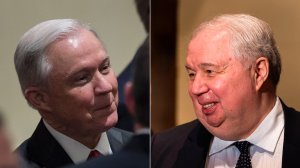Congressional investigators are examining whether Attorney General Jeff Sessions had an additional private meeting with Russia’s ambassador during the presidential campaign, according to Republican and Democratic Hill sources and intelligence officials briefed on the investigation.

Investigators on the Hill are requesting additional information, including schedules from Sessions, a source with knowledge tells CNN. They are focusing on whether such a meeting took place April 27, 2016, at the Mayflower Hotel in Washington, DC, where then-candidate Donald Trump was delivering his first major foreign policy address. Prior to the speech, then-Sen. Sessions and Russian Ambassador Sergey Kislyak attended a small VIP reception with organizers, diplomats and others.
In addition to congressional investigators, the FBI is seeking to determine the extent of interactions the Trump campaign team may have had with Russia’s ambassador during the event as part of its broader counterintelligence investigation of Russian interference in the election. The FBI is looking into whether there was an additional private meeting at the Mayflower the same day, sources said. Neither Hill nor FBI investigators have yet concluded whether a private meeting took place — and acknowledge that it is possible any additional meeting was incidental.
“The Department of Justice appointed special counsel to assume responsibility for this matter,” Department of Justice spokeswoman Sarah Isgur Flores said in a statement to CNN. “We will allow him to do his job. It is unfortunate that anonymous sources whose credibility will never face public scrutiny are continuously trying to hinder that process by peddling false stories to the mainstream media. The facts haven’t changed; the then-Senator did not have any private or side conversations with any Russian officials at the Mayflower Hotel.”
Sessions has previously failed to disclose meetings with Russian officials. During his confirmation hearing on January 10, Sessions testified that he “did not have any communications with the Russians” during the campaign. He also said in a written statement submitted to the Senate judiciary committee that he was not in contact with anyone linked to the Russian government during the election.
Those answers became problematic for Sessions when reports emerged in March that he did have two meetings with Kislyak during the campaign — one at the Republican National Convention in July and one in his Senate office in September. Sessions conceded that the meetings happened but insisted they were part of his Senate duties and had nothing to do with the campaign. Nonetheless, Sessions was forced to recuse himself from the Russia investigation.
Asked at a news conference on March 2 whether there were any other meetings with Russians besides those two, Sessions told reporters, “I don’t believe so — you know, we meet a lot of people — I don’t believe so.”
Later that week, when Sessions updated his sworn testimony to the Senate judiciary committee, he acknowledged the two meetings with Kislyak but did not mention any encounter at the Mayflower Hotel.
“I do not recall any discussions with the Russian ambassador, or any other representative of the Russian government, regarding the political campaign on these occasions or any other occasion,” Sessions wrote.
CNN reported last week that Sessions didn’t list the two Kislyak meetings that he disclosed in March on the security forms he submitted this year. Flores said the FBI employee who helped Sessions fill out the forms instructed him to exclude foreign meetings that he considered to be part of his official Senate duties.
Russia was already trying to help Trump before the Mayflower Hotel speech, according to a US intelligence community assessment released in January. The report concluded that by March 2016, Kremlin-backed news outlets began supporting Trump and Russian military intelligence had kicked off its election-related cyber operations.
One day before the speech, Trump won commanding primary victories in five Northeast states, cementing his front-runner status and putting him on a track to secure the bitterly contested Republican nomination.
In the speech, Trump stressed his “America first” message and talked about the fight against terrorism. He offered an olive branch to the Kremlin in line with his comments throughout the campaign — but out of step with much of the US foreign policy establishment and all of his fellow presidential hopefuls.
“We desire to live peacefully and in friendship with Russia and China,” Trump said in his remarks. “We have serious differences with these two nations, and must regard them with open eyes. But we are not bound to be adversaries. We should seek common ground based on shared interests. Russia, for instance, has also seen the horror of Islamic terrorism. I believe an easing of tensions and improved relations with Russia — from a position of strength — is possible.”
Kislyak listened to the speech from the front row.





